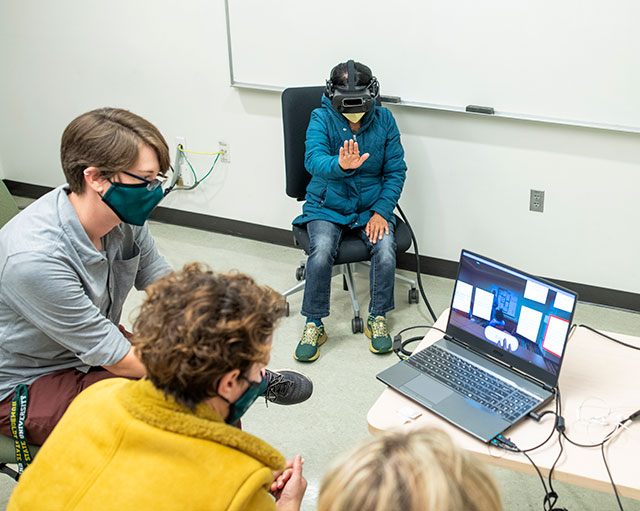
A pillar of HSU’s Nursing program is its holistic approach to patient-centered care, which prioritizes empathy and cultural humility in every interaction. It’s a value that cannot be easily taught, explains HSU Director of Nursing Kimberly Perris. This is where virtual reality (VR) technology can deliver an outsized impact.
Perris first learned about Embodied Labs from faculty at CSU Channel Islands, the first CSU campus to champion Embodied Labs VR experiences as a teaching tool for nurses. With the goal of helping nurses understand the lived experience of their patients and co-workers, Embodied Labs created six simulations in which students, donning a VR headset, virtually “embody” a patient or caregiver facing a myriad of socio-emotional and medical challenges. The simulations translate seamlessly to virtual learning, says Perris, even giving some students the necessary emotional space to absorb the experiences.
In one immersive simulation, the user embodies Hazel, a 75-year-old woman living in a senior community. Hazel has mobility issues and uses a wheelchair. As the student user navigates Hazel’s everyday life, they experience the frustration and anxiety of relying on others for activities of daily living. With each scenario serving a specific learning outcome, this one helps nurses find ways to preserve patients’ dignity through patient-centered, collaborative problem solving.
Another Embodied Labs simulation brings to light the perspective of a transgender patient named Eden. Transgender youth and adults can face elevated, even extreme, stigma in healthcare settings, negatively compounding their health and wellness. By embodying Eden, student users witness, and even feel, the experience of being an LGBQT adult as they navigate challenges with family, healthcare, and housing.
“These simulations are incredibly impactful for our students,” says Perris.
When she first tried VR for herself, Perris embodied Alfred, an aging African-American man who had declining vision and hearing loss. “I was watching the reactions of his family at the dinner table. There was an incident when Alfred spilled a glass of wine. I could see his hands––my hands––and actually grasp his sense of shame,” she says. Perris felt an emotional charge after the simulation and knew she had to share the technology with her nursing students at HSU.
People assume that nurses are naturally empathetic, says Perris, but no one can understand how someone else feels until you’re in their shoes––especially when discrimination and disorientation are at play. “VR is not only helping our graduates gain a more well-rounded perspective of patient-centered care but helping to build the values of compassion and inclusion throughout our community.”
The Embodied Labs simulations use real actors whose characters face common challenges, such as social isolation, caregiver burnout, and PTSD, which can evoke many emotions for viewers. The simulations also take place in a range of settings where health care interactions take place, from skilled nursing facilities to hospice care to private family homes.
“After the VR simulations are over, the experience helps inform conversations between our students, and ultimately, impacts the care they provide to the community,” says Eden Donahue, HSU’s Associate Director of Nursing. In addition, nursing students are learning cultural humility by studying health literacy, and researching complex case studies that represent the unique needs of specialized populations, including rural and tribal communities, says Donahue.
“We’re excited to keep exploring this technology, and also to work with our campus partners, like Social Work, and possibly other nursing programs in the future,” says Perris. “It will only get us thinking beyond our bubble, and as nurses, that’s what expanding our perspective and skillset is all about.”